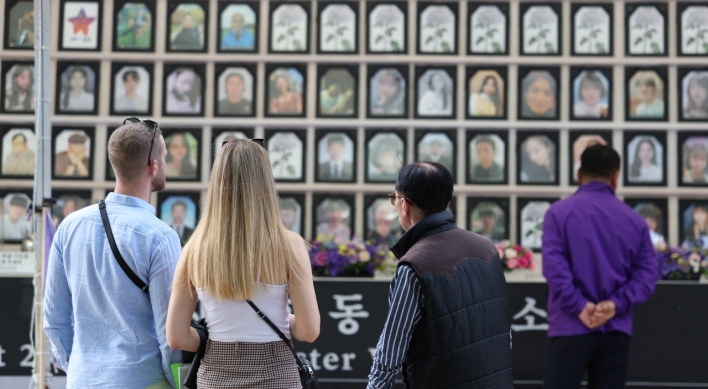Food waste water dispute in Seoul had been foreseen
By Kim Young-wonPublished : Jan. 22, 2013 - 19:38
The recent food waste stink caused by disputes between district governments of Seoul City and private food waste management firms could have been prevented if measures prepared by the Ministry of Environment five years ago had been swiftly implemented.
The food disposal firms at 16 district governments have been refusing to pick up food waste, demanding a price increase in food waste treatment services.
District governments, however, are reluctant to pay more, saying the demands are too high: the firms are seeking a 50 percent increase.
In order to untie this intricate knot, the Ministry of Environment came up with plans Tuesday including measures to set appropriate prices for disposal of food waste and build public disposal facilities.
However, the plans were almost the same as the ones proposed and recommended by the ministry to each district government in 2007, which makes it harder for precinct governments to avoid criticism.
“Since they were non-binding rules, they have not been quickly implemented at Seoul’s district governments yet,” an official from the Ministry of Environment said.
The 2007 plan was a countermeasure for the Convention on the Prevention of Marine Pollution by Dumping of Wastes and Other Matter, under which a country is banned to release food waste water into the sea.
Korea joined the convention in 1993.
In the plan, the ministry recognized the need to increase the commission fee for disposal at least to 90,000 won ($85) per ton of food waste from 55,000 won to 80,000 won.
And the ministry proposed cost guidelines which require around 90,000 won in 2010, but the district governments turned a blind eye to the proposal, citing high costs.
The prices for disposal, albeit varying from district to district, have remained unchanged in most precincts since 2008, according to the ministry.
The ministry’s plan also included imposing a bigger proportion of the cost on residents but it came to no avail.
As the dispute between the district governments and the private firms caused a mess on the streets with rotting food waste, the Seoul city government which has intervened belatedly announced a plan Tuesday to clear up food waste.
“The city will clean up the streets littered with food waste by the end of this week. And it will try to set standard fees for the disposal services through talks with firms and district governments by the end of this month,” Lim Ok-ki, assistant mayor at the climate and environment headquarters of the city government, said at a press briefing.
Around 600 tons of food waste in Gwanak-gu and 200 tons in Nowon-gu have piled up on streets, and some other district governments are grappling with untreated food waste.
By Kim Young-won (wone0102@heraldcorp.com)
The food disposal firms at 16 district governments have been refusing to pick up food waste, demanding a price increase in food waste treatment services.
District governments, however, are reluctant to pay more, saying the demands are too high: the firms are seeking a 50 percent increase.
In order to untie this intricate knot, the Ministry of Environment came up with plans Tuesday including measures to set appropriate prices for disposal of food waste and build public disposal facilities.
However, the plans were almost the same as the ones proposed and recommended by the ministry to each district government in 2007, which makes it harder for precinct governments to avoid criticism.
“Since they were non-binding rules, they have not been quickly implemented at Seoul’s district governments yet,” an official from the Ministry of Environment said.
The 2007 plan was a countermeasure for the Convention on the Prevention of Marine Pollution by Dumping of Wastes and Other Matter, under which a country is banned to release food waste water into the sea.
Korea joined the convention in 1993.
In the plan, the ministry recognized the need to increase the commission fee for disposal at least to 90,000 won ($85) per ton of food waste from 55,000 won to 80,000 won.
And the ministry proposed cost guidelines which require around 90,000 won in 2010, but the district governments turned a blind eye to the proposal, citing high costs.
The prices for disposal, albeit varying from district to district, have remained unchanged in most precincts since 2008, according to the ministry.
The ministry’s plan also included imposing a bigger proportion of the cost on residents but it came to no avail.
As the dispute between the district governments and the private firms caused a mess on the streets with rotting food waste, the Seoul city government which has intervened belatedly announced a plan Tuesday to clear up food waste.
“The city will clean up the streets littered with food waste by the end of this week. And it will try to set standard fees for the disposal services through talks with firms and district governments by the end of this month,” Lim Ok-ki, assistant mayor at the climate and environment headquarters of the city government, said at a press briefing.
Around 600 tons of food waste in Gwanak-gu and 200 tons in Nowon-gu have piled up on streets, and some other district governments are grappling with untreated food waste.
By Kim Young-won (wone0102@heraldcorp.com)







![[Music in drama] Rekindle a love that slipped through your fingers](http://res.heraldm.com/phpwas/restmb_idxmake.php?idx=644&simg=/content/image/2024/05/01/20240501050484_0.jpg&u=20240501151646)



![[New faces of Assembly] Architect behind ‘audacious initiative’ believes in denuclearized North Korea](http://res.heraldm.com/phpwas/restmb_idxmake.php?idx=644&simg=/content/image/2024/05/01/20240501050627_0.jpg&u=20240502093000)






